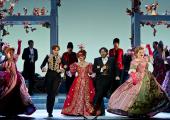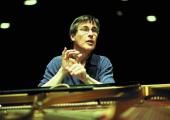Instead, he accepts it as it is: a middle-class fantasy of the high life with Vienna as its simulacrum, an immaculate study in vapid, delicious pleasure, a joke at the expense of expensive jokes and, above all, a dazzling score that never lets up from first note to last.
Copley perhaps updates the setting a touch, though in a work whose dramatis personae are constantly in and out of costume, it’s hard to be sure. In any case the stars of the evening, in my book, are the designers, Tim Reed and Deirdre Clancy, and the lighting designer Howard Harrison, who provide a visual treat that never strays into the vulgarity modern stagings find so tempting in this piece. Bankers are (naturally) invoked in the Pountney/Hancock translation as Eisenstein’s likely fellow inmates in the local jail; but happily their tastes in décor are mostly left alone. The Eisensteins are parvenus, of course, and their suburban villa shows it. But the bored, fun-loving millionnaire Prince Orlofsky (vividly played and sung en travesti by Helen Lepalaan from Estonia) knows how to party in style; is no oligarch; won’t, one feels, be buying football clubs: his palace offers a restrained, semi-exterior setting for a range of genuinely exquisite costumes, subtly lit, and even the prison is the sort of establishment where one might not mind meeting one’s banker, at least if one could avoid the ghastly Frosch (Desmond Barrit).
The evening’s other main feature is the conducting of
Thomas Rösner, a Viennese in a piece that can die without style. In his hands the music lilts and sparkles, and the orchestra dances brilliantly to his tune. For the singers, in translation, he could perhaps give a shade more time in the quicker numbers – Orlofsky’s champagne song, or Eisenstein’s initial Terzetto. Rösner, I guess, is used to Viennese singers who have this music in their pocket. But this will come, even in the Land of Song.
The WNO cast is clever, musicianly and highly watchable, thanks not least to Stuart Hopps’s neat choreography, which goes well beyond the regulation of formal dance. Joanne Boag shines as Adele, buxom but agile and clear-voiced in her laughing couplets; and while Nuccia Focile struggles to get Rosalinde’s Csárdás across in this big theatre, she is excellent elsewhere, including in her scenes with the spoof tenor Alfred (Paul Charles Clarke), who sings almost as much Verdi as Strauss and insists on her calling him Alfredo.
Opposite her, Mark Stone is a stylish Eisenstein, enough of a baritone, as Rösner points out in his programme-book interview, to project the rather wordy numbers Strauss gives him, but lyrically tenorish when required. Alan Opie is a witty Frank, a Hapsburg stuffed uniform who breaks into a two-step when instructed by the music. David Stout presides as a just sufficiently sinister Falke, spectacularly transformed into a bat for the finale, but warm enough in the Brüderlein ensemble, a number which typifies the essential pointlessness but irresistible charm of Viennese operetta.










